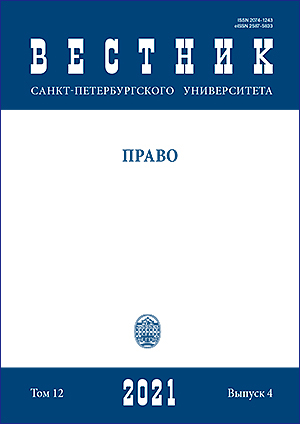The prohibition on entering into financial transactions with foreign counterparties and its extension to deputies of regional parliaments
DOI:
https://doi.org/10.21638/spbu14.2021.409Abstract
The article examines the problems of legal regulation of the prohibition for officials to open and have accounts (deposits), store cash and valuables in foreign banks located outside Russia, own and (or) use foreign financial instruments, associated with the extension of this prohibition to deputies of legislative authorities of the constituent entities of the Russian Federation. Based on the analysis of current federal and regional legislation, the authors have identified various approaches to the formation of a list of public offices at the level of the constituent entities of the Russian Federation. It was also found that the provisions of regional normative legal acts determine the effect of this prohibition in different ways in a circle of persons and often extend it only to those deputies of the legislative (representative) authorities of the constituent entities of the Russian Federation who exercise their powers on an ongoing basis. The existing practice of regional rulemaking contradicts the goals of ensuring the national security of the state, for the achievement of which the considered prohibition was established, since all deputies, regardless of the basis for filling the corresponding position, have equal powers to participate in the activities of the collegial body by implementing law-making initiatives and voting on the agenda of the meeting. The authors come to the conclusion that issues concerning the spread of anti-corruption standards of conduct to certain categories of persons holding government positions in the constituent entities of the Russian Federation cannot be attributed to the subject of joint jurisdiction. In this regard, at the level of federal legislation, it is necessary to provide a provision for the extension of this prohibition to deputies of the legislative authorities of the constituent entities of the Russian Federation who exercise their powers both on a permanent and non-permanent basis.
Keywords:
corruption, countering corruption, anti-corruption standards of conduct, foreign financial instruments, public office, legislative power, representative authorities, deputy, elected official, anti-corruption security
Downloads
References
Downloads
Published
How to Cite
Issue
Section
License
Articles of "Vestnik of Saint Petersburg University. Law" are open access distributed under the terms of the License Agreement with Saint Petersburg State University, which permits to the authors unrestricted distribution and self-archiving free of charge.






